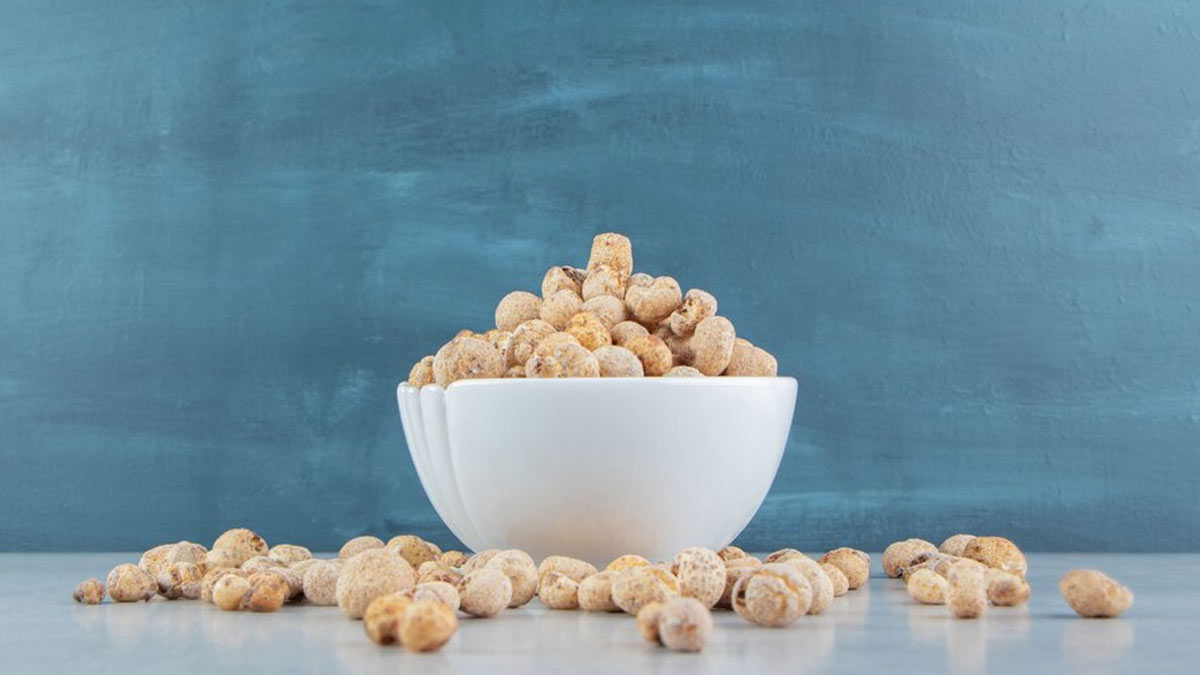
Originating in the Mithilanchal region of Bihar, Makhana, widely known as fox nuts or lotus seeds, has gained popularity as a healthy snack in recent years. These seeds, harvested from the Euryale fox plant, are rich in nutrients and have been used in traditional medicine for centuries. They come in various forms, but the most common ways to consume them are roasted or dry. Let’s compare the health benefits of roasted makhana and dry makhana to determine which one is better for your health.
Table of Content:-
Nutritional Profile of Makhana
Before diving into the specifics of roasted and dry makhana, let's look at the general nutritional profile of makhana. Makhana is low in calories and high in protein, fibre, and essential micronutrients like magnesium, potassium, and phosphorus. They also contain antioxidants, which help protect the body from oxidative stress and inflammation.

Also read: Fox Nuts: Health Benefits, Side Effects, Nutritional Value And Ways To Eat
Roasted Makhana
Preparation: Roasted makhana is made by dry roasting the seeds in a pan without any oil or with minimal ghee or olive oil for added flavour. They can be seasoned with spices like turmeric, black pepper, or chaat masala for a tasty snack.
Health Benefits:
- Enhanced Flavour and Texture: Roasting makhana enhances its flavour and makes it crunchy, making it a more appealing snack for many people. This can help satisfy cravings for unhealthy snacks.
- Better Digestibility: The roasting process can make makhana easier to digest, as the heat helps break down complex carbohydrates.
- Antioxidant Boost: Roasting can enhance the antioxidant properties of makhana, helping to combat oxidative stress and inflammation in the body.
- Low-Calorie Snack: Roasted makhana remains low in calories, making it an excellent choice for weight management.
Potential Drawbacks:
- Nutrient Loss: Roasting at high temperatures for extended periods can lead to the loss of some heat-sensitive nutrients, such as certain vitamins.
- Added Ingredients: Depending on the preparation method, added ingredients like ghee or spices can increase the calorie content and affect the overall nutritional value.
Dry Makhana
Preparation: Dry makhana is simply the raw seeds without any additional processing. They are often used in cooking, added to dishes, or consumed as they are.
Health Benefits:
- Unprocessed: Dry makhana retains all its natural nutrients since it undergoes no heat treatment or additional processing.
- Versatile: They can be used in a variety of dishes, both sweet and savoury, providing a flexible ingredient for a balanced diet.
- Hydration: Soaking dry makhana in water before consumption can help with hydration and may make the seeds easier to digest.
- Nutrient-Rich: Dry makhana is a good source of protein, fibre, and essential minerals, contributing to overall health and wellness.
Potential Drawbacks:
- Texture and Taste: Some people may find dry makhana less appealing in terms of taste and texture compared to the roasted version.
- Digestibility: Raw makhana may be harder to digest for some individuals, leading to gastrointestinal discomfort.
Which One is Better for Health?
The choice between roasted and dry makhana ultimately depends on individual preferences and specific health goals. Here’s a comparison to help you decide:
For Weight Management:
Roasted Makhana: Due to its low-calorie content and enhanced flavour, roasted makhana can be a satisfying snack that helps control cravings for unhealthy foods.

For Nutrient Retention:
Dry Makhana: If maximum nutrient retention is your goal, dry makhana is the better choice as it is unprocessed and retains all its natural vitamins and minerals.
Also read: Makhanas Help In Losing Weight? Here Are Some Healthy Ways To Eat Fox nuts For Weight Loss
For Digestibility:
- Roasted Makhana: The roasting process can make makhana easier to digest, which can be beneficial for those with sensitive stomachs.
- Dry Makhana: Dry makhana can be incorporated into a wide variety of dishes, offering more versatility in your diet.
Both roasted and dry makhana offer unique health benefits, making them excellent additions to a healthy diet. Roasted makhana is a great option for a tasty, low-calorie snack that is easy to digest and rich in antioxidants. On the other hand, dry makhana provides maximum nutrient retention and versatility in cooking.
Ultimately, incorporating both forms into your diet can provide a balanced approach to enjoying the health benefits of makhana. Whether you prefer the crunchy texture of roasted makhana or the nutrient-dense profile of dry makhana, both can contribute to your overall health and wellness.
Also watch this video
How we keep this article up to date:
We work with experts and keep a close eye on the latest in health and wellness. Whenever there is a new research or helpful information, we update our articles with accurate and useful advice.
Current Version